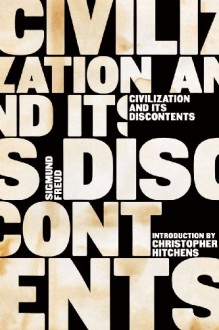Civilization and Its Discontents (Complete Psychological Works of Sigmund Freud)
Freud’s seminal volume of twentieth-century cultural thought grounded in psychoanalytic theory, now with a new introduction by Christopher Hitchens.Written in the decade before Freud’s death, Civilization and Its Discontents may be his most famous and most brilliant work. It has been praised,...
show more
Freud’s seminal volume of twentieth-century cultural thought grounded in psychoanalytic theory, now with a new introduction by Christopher Hitchens.Written in the decade before Freud’s death, Civilization and Its Discontents may be his most famous and most brilliant work. It has been praised, dissected, lambasted, interpreted, and reinterpreted. Originally published in 1930, it seeks to answer several questions fundamental to human society and its organization: What influences led to the creation of civilization? Why and how did it come to be? What determines civilization’s trajectory? Freud’s theories on the effect of the knowledge of death on human existence and the birth of art are central to his work. Of the various English translations of Freud’s major works to appear in his lifetime, only Norton’s Standard Edition, under the general editorship of James Strachey, was authorized by Freud himself. This new edition includes both an introduction by the renowned cultural critic and writer Christopher Hitchens as well as Peter Gay’s classic biographical note on Freud.
show less
Format: paperback
ISBN:
9780393304510 (0393304515)
ASIN: 393304515
Publish date: August 9th 2010
Publisher: W. W. Norton & Company
Pages no: 186
Edition language: English
Category:
Classics,
Non Fiction,
History,
Academic,
School,
Politics,
Philosophy,
College,
Sociology,
Psychology,
Theory

At one time it was wrongly believed that ontogeny recapitulates phylogeny (i.e. the embryonic stages mirrors the development stages of the species). Similarly Freud thinks the phases that an individual goes through mirror the same phases that civilizations have gone through. Freud uses that theme ...

گاهی فرد، واقعیت را تنها دشمنی میداند که سرچشمهٔ همهٔ رنجهاست، ... و از این رو آدمی اگر بخواهد سعادتممند باشد باید همهٔ روابطش را با واقعیت قطع کند... میتوان از این هم پیشتر رفت، میتوان جهان را دوباره ساخت، ... و خصوصیات دیگری که با آرزوهای فرد تطابق داشته باشد جای آنرا بگیرند... چنین فردی دیو...

Probably more enjoyable for someone who is more familiar with freud's body of work than I am. Nonetheless, nothing objectionable about the writings of a conscientious man who appreciates Goethe and heine.






 8 years ago
8 years ago